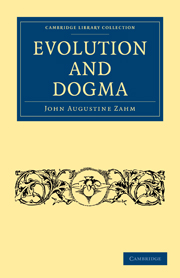Summary
Τῷ µὲν γὰρ ἀληθεἰ πάντα συνᾴδει τα ὐπάρχοντα, τα δὲ ψενδεῖ ταχὺ διαϕωνεῖ τἀληθές.
Aristotle.“For with the truth all things that exist are in harmony, but with the false the true at once disagrees.”
The present work is devoted chiefly to the discussion of three topics which, although in a measure independent one of the other, are, nevertheless, so closely allied that they may be viewed as parts of one and the same subject. The first of these topics embraces a brief sketch of the evolutionary theory from its earliest beginnings to the present time; the second takes up the pros and the cons of the theory as it now stands; while the third deals with the reciprocal and little-understood relations between Evolution and Christian faith.
It is often supposed by those who should know better, that the Evolution theory is something which is of very recent origin; something about which little or nothing was known before the publication of Charles Darwin's celebrated work, “The Origin of Species.” Frequently, too, it is confounded with Darwinism, or some other modern attempt to explain the action of Evolution, or determine the factors which have been operative in the development of the higher from the lower forms of life. The purpose of the first six chapters of this book is to show that such views are unwarranted; that Evolution, far from being of recent date, is a theory whose germs are discernible in the earliest dawn of philosophic thought.
- Type
- Chapter
- Information
- Evolution and Dogma , pp. 1 - 12Publisher: Cambridge University PressPrint publication year: 2009First published in: 1896



